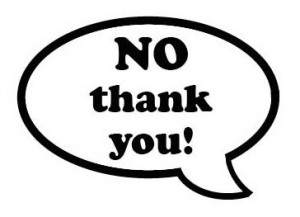 We’re in the business of saying yes … but just as important can be knowing when to say no – some projects may just be more trouble than they are worth. Here are some warning signs to look out for so you can maintain good boundaries with your freelance clients:
We’re in the business of saying yes … but just as important can be knowing when to say no – some projects may just be more trouble than they are worth. Here are some warning signs to look out for so you can maintain good boundaries with your freelance clients:
-
An unreasonably long test
You have to decide what you consider unreasonable, of course, and it may depend on how much you want the work, and how much work you stand to gain if you’re successful. Bear in mind too that taking a test can be a brilliant way in if you are starting out, as it effectively gets around the need for experience to prove yourself.
-
Refusal to stay within acceptable boundaries
Is the prospective client emailing you every half-hour with queries, or demanding instant answers? Do they telephone you outside normal working hours? This lack of regard for your time can signal a potentially problematic working relationship.
-
A large or complex project offered for a flat fee
We often hear that per-page or per-word rates are best because they reward efficient working practices. But be wary of taking on a long or very complicated job on this basis, unless you have worked on something similar for that client before. If you do proceed, aim to build in agreement from the start that the budget will need to be reviewed if the hours exceed a limit.
-
Unwillingness to discuss the budget
Refusal on the client’s part to commit to a figure, even when asked, is a bad sign. Negotiating can be difficult on both sides – but there still needs to be discussion and agreement about the cost before the job begins.
-
Refusal to agree project terms in writing
The contract for a project could take the form of an email or series of emails in which key details are agreed; it doesn’t have to be on paper, or even very formal. But you do need to have things pinned down; an agreement over the telephone or even in person won’t do, and you can’t refer back to it reliably.
-
Does the client fail to send the work on time, without warning or explanation?
If so, don’t feel you have to accommodate this. You may choose to, of course – it’s not unusual for projects to run late, and being adaptable can work in your favour – but don’t be bullied into working to their schedule if they show no respect for yours.
-
A sense that the project, for whatever reason, is not right for you
Learn to trust your instincts – they are very often right.
It can take time to learn when to say no, and even after years as a freelance editor, it’s still possible to get it wrong sometimes. What factors would make you turn a project down?
Posted by Liz Jones, The former CIEP (then SfEP) marketing and PR director.
Proofread by CIEP provisional intermediate member Gary Blogg.
The views expressed here do not necessarily reflect those of the CIEP.
